Unit 5 第二课时 Section A(Grammar Focus-3c) 课件【大单元教学】人教版七年级英语上册Unit 5 Do you have a soccer ball
文档属性
| 名称 | Unit 5 第二课时 Section A(Grammar Focus-3c) 课件【大单元教学】人教版七年级英语上册Unit 5 Do you have a soccer ball | 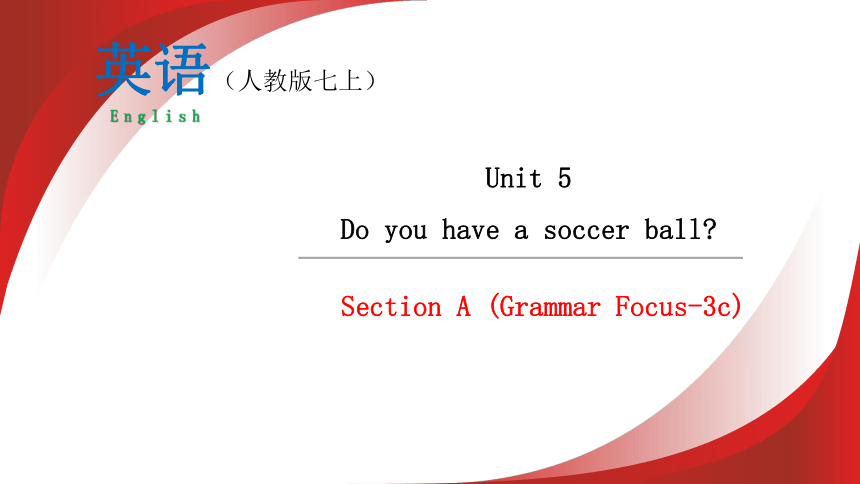 | |
| 格式 | pptx | ||
| 文件大小 | 6.5MB | ||
| 资源类型 | 试卷 | ||
| 版本资源 | 人教新目标(Go for it)版 | ||
| 科目 | 英语 | ||
| 更新时间 | 2023-09-21 13:35:05 | ||
图片预览


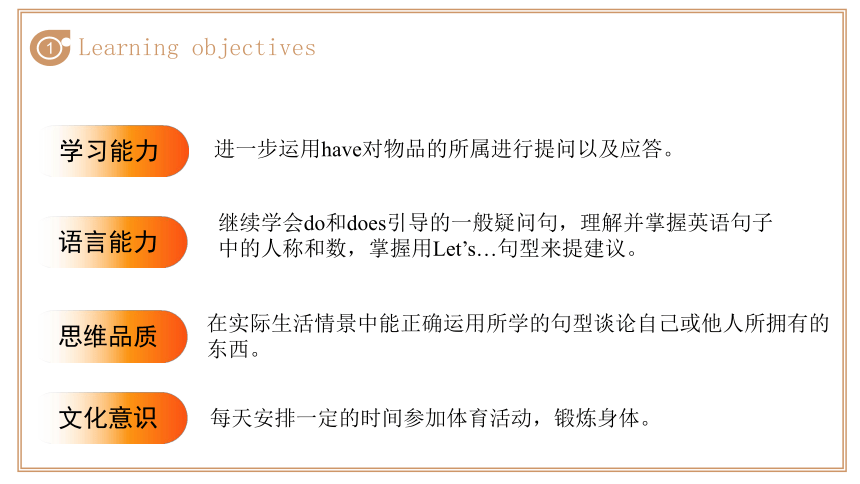
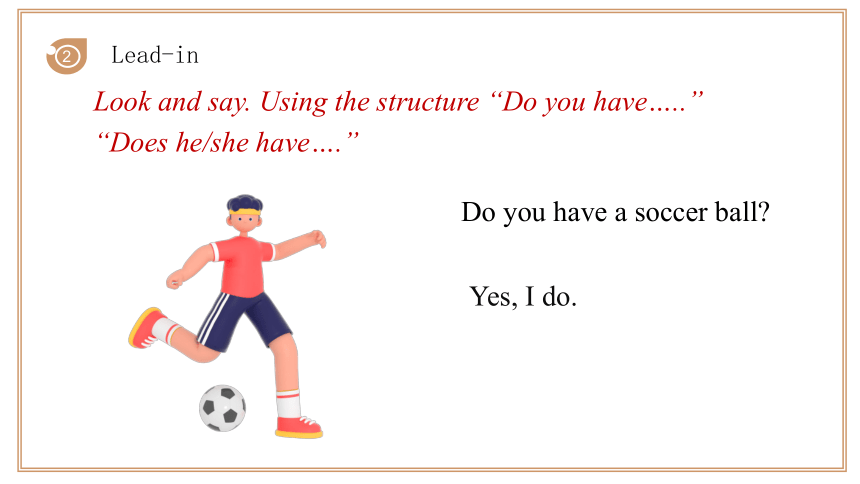
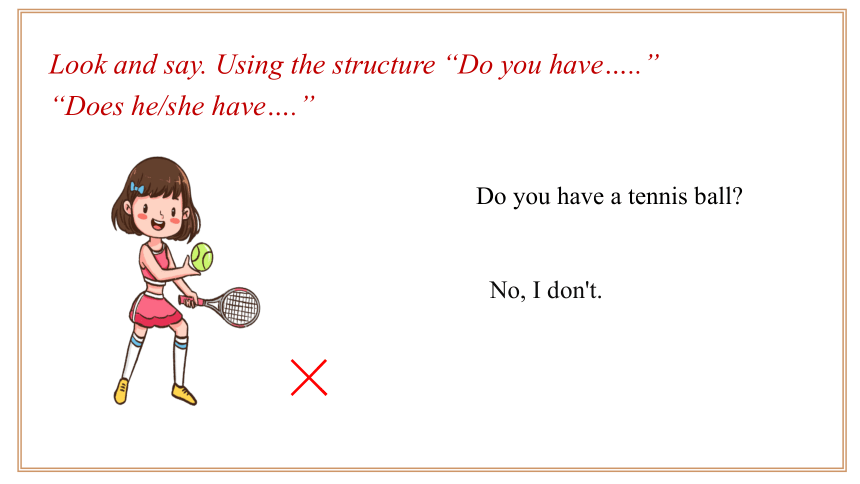
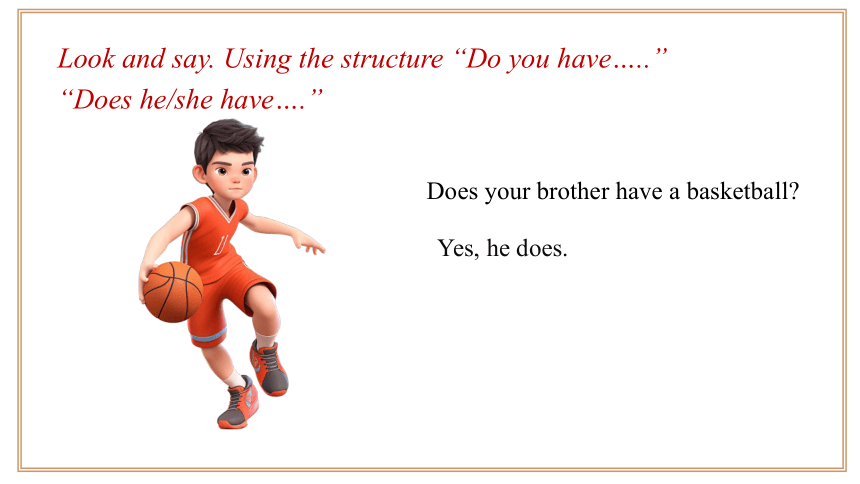
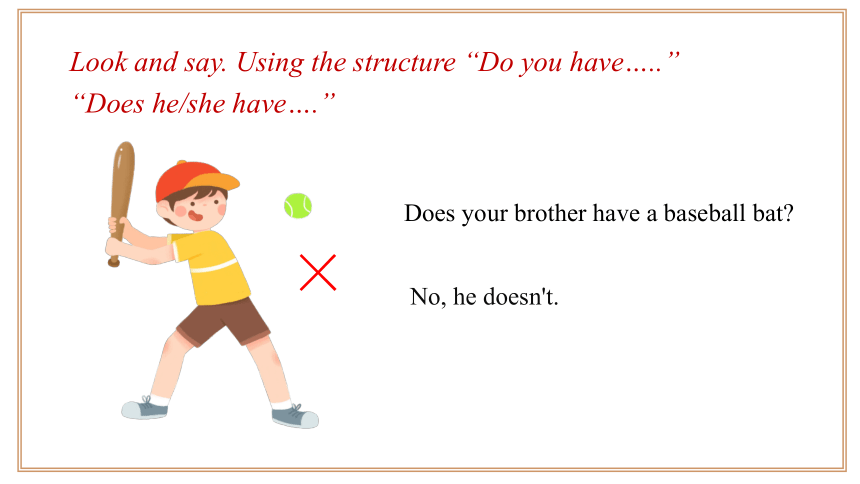
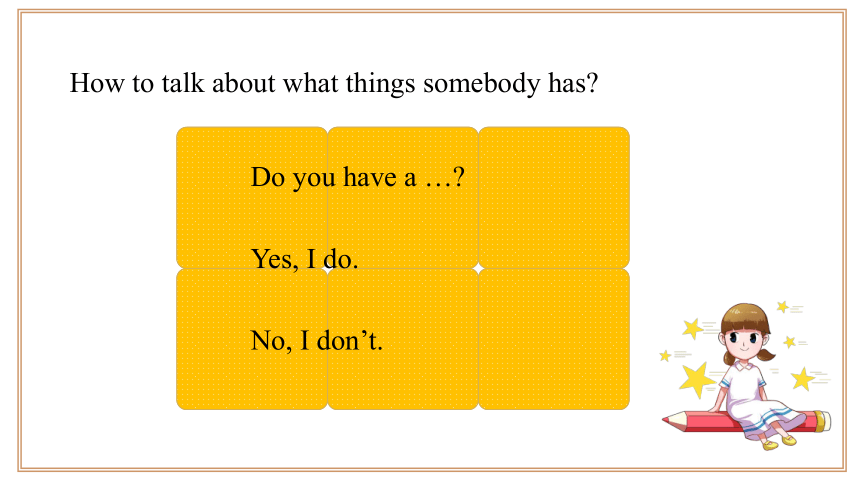
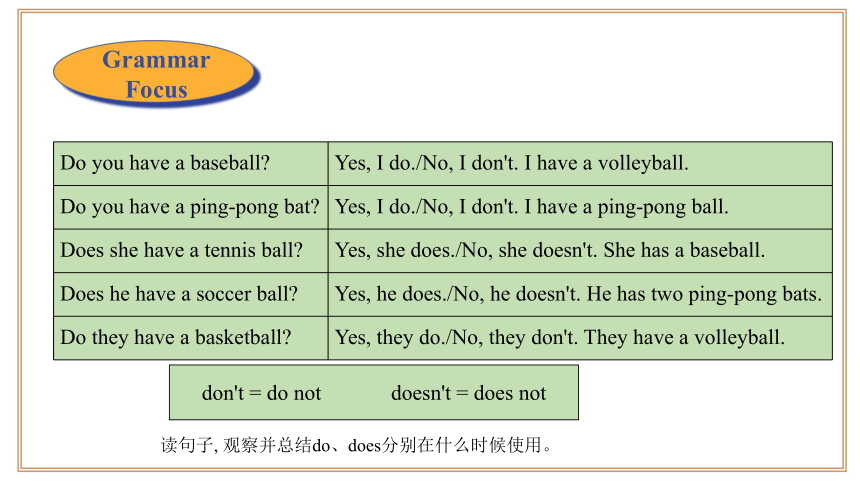
文档简介
(共28张PPT)
英语(人教版七上)
English
Section A (Grammar Focus-3c)
Unit 5
Do you have a soccer ball
Lead-in
1
2
Practice
3
Content
Summary
5
Exercises
6
Consolidation
4
Learning objectives
进一步运用have对物品的所属进行提问以及应答。
继续学会do和does引导的一般疑问句,理解并掌握英语句子中的人称和数,掌握用Let’s…句型来提建议。
文化意识
语言能力
思维品质
学习能力
在实际生活情景中能正确运用所学的句型谈论自己或他人所拥有的东西。
每天安排一定的时间参加体育活动,锻炼身体。
1
Learning objectives
Look and say. Using the structure “Do you have…..”
“Does he/she have….”
Do you have a soccer ball
Yes, I do.
Lead-in
2
Do you have a tennis ball
No, I don't.
Look and say. Using the structure “Do you have…..”
“Does he/she have….”
×
Does your brother have a basketball
Yes, he does.
Look and say. Using the structure “Do you have…..”
“Does he/she have….”
Does your brother have a baseball bat
No, he doesn't.
×
Look and say. Using the structure “Do you have…..”
“Does he/she have….”
Do you have a …
Yes, I do.
No, I don’t.
How to talk about what things somebody has
Do you have a baseball Yes, I do./No, I don't. I have a volleyball.
Do you have a ping-pong bat Yes, I do./No, I don't. I have a ping-pong ball.
Does she have a tennis ball Yes, she does./No, she doesn't. She has a baseball.
Does he have a soccer ball Yes, he does./No, he doesn't. He has two ping-pong bats.
Do they have a basketball Yes, they do./No, they don't. They have a volleyball.
don't = do not doesn't = does not
读句子, 观察并总结do、does分别在什么时候使用。
Grammar
Focus
第一、第二人称单复数, 以及第三人称复数作主语时, 用do构成一般疑问句, 回答用do或don’t。
助动词do
第三人称单数作主语时, 用does构成一般疑问句, 回答用does或doesn’t。
don’t 相当于 do not, doesn’t 相当于 does not。在口语中常用这类缩略形式。
行为动词也叫实义动词,是表示动作或状态的词。行为动词have意为“有”,表示所属关系,其主语一般是人,强调某人拥有某物,有时也可以用物作主语。在一般现在时中有两种形式:have和has,当主语是第三人称单数时用has,其他人称用have。
行为动词have的一般现在时
语法概述
含行为动词have的一般现在时的句式结构
肯定句 主语+ have/ has+其他. I have a computer.我有一台电脑。
Gina has a cat. 吉娜有一只猫。
否定句 主语+don’t/ doesn’t have + 其他. We don’t have a basketball. 我们没有篮球。
She doesn’t have a football. 她没有足球。
一般疑问句 Do/ Does + 主语+ have + 其他? 肯定回答: Yes, 主语+ do/ does. 否定回答; No, 主语+ don’t/ doesn’t. —Do they have an English class today 他们今天有英语课吗?
—Yes, they do./ No, they don’t. 是的, 他们有。/ 不, 他们没有。
—Does she have a dictionary 她有一本词典吗?
—Yes, she does./ No, she doesn’t. 是的,她有。/ 不, 她没有。
Write each word in the correct place in the chart.
3a
I he they you
we she it Eric
do does
I
he
they
you
we
she
it
Eric
Practice
3
数 人称 汉语 主格 助动词
单数 第一人称 我 I
第二人称 你 you 第三人称 他 he
她 she 它 it 复数 第一人称 我们 we
第二人称 你们 you 第三人称 他/她/它们 they do
does
do
注:除了he/she/it之外,单独的一个人/物(I/you除外),也属于第三人称单数,对应的助动词也用does。
My father doesn't have a car.
我爸爸没有小汽车。
Does the dog have a name
这条狗有名字吗?
英语句子里的人称和数
Role-play
Do you have a baseball
Yes, I do.
Great! I have a bat. Let’s play!
Fill in the blanks with do or does. Then practice the conversations with your partner.
3b
A: _____ you have a baseball
B: Yes, I ____.
A: Great! I have a bat. Let’s play!
Do
do
A: ______ John have a soccer ball
B: No, he ________.
A: ______ he have a ping-pong bat
B: Yes, he ______. I think he has
ping-pong ball, too.
A: Hmm… let’s ask.
Does
doesn’t
Does
does
A: _____ your friends have
a basketball
B: Yes, they ____. They
have two basketballs.
A: Well, let’s play basketball.
B: That sounds good.
Do
do
Consolidation
4
Language points
1. Great! I have a bat. (教材P27 3b)
great adj. 美妙的;伟大的
great独立成句,常用于口语中,表示说话人的喜悦之情,通常意为“太好了”。
Lu Xun is a great writer. 鲁迅是一位伟大的作家。
—I get a ticket to the show. 我得到了一张演出的票。
—Great! 太棒了!
2. Well, let’s play basketball. (教材P27 3b)
play v.参加(比赛或运动); 玩耍
1) play在此处是及物动词,后接表示球类运动的名词时,play 与球类运动名词之间不加冠词。
2) play作动词还可意为 “玩耍”,play with sb./sth.表示“和某人一起玩/玩……”。
3) play作动词,还可意为“演奏;弹奏” ,后接表示乐器的名词时,乐器名词前要加定冠词the。
He often plays volleyball after school. 他放学后经常打排球。
I often play with Tom. We usually play with a ball.
我经常和汤姆玩。我们通常玩球。
She can play the piano. 她会弹钢琴。
3. That sounds good. (教材P27 3b)
sound v.听起来好像
sound在此处作连系动词, 也是感观动词, 后常接形容词作表语。
That sounds interesting. 那听起来很有趣。
sound的其他含义:
3. That sounds good. (教材P27 3b)
sound v.听起来好像
常见的感观动词:
Remember the things in Bob’s room. Then close your books and ask and answer questions with a partner.
3c
A: Does Bob have a soccer ball
B: Yes, he does.
Consolidation
4
Role-play
Does Bob have a baseball
Yes, he does.
Great! And does Bob have a baseball bat
Yes, he does.
1.We have learnt to use “have” to ask and answer the ownership of things.
2.We have learnt to use general questions guided by“ do ”and “does”.
3.We have learnt to use the “Let 's. . . ” to give advice.
Summary
5
1. — _____ you have a volleyball
— No, I _____. But my sister _____ a new one.
A. Do, don’t, have B. Do, don’t, has
C. Does, doesn’t, have D. Does, doesn’t, has
2. — _____ Anna _____ a ping-pong bat — Yes, she _____.
A. Do, have, do B. Does, have, does
C. Do, have, has D. Does, have, has
一、单项选择
B
B
Exercises
6
3.—Let’s go for a picnic this weekend.
— . I like it very much.
A. Sounds great B. You’re welcome C. You are right D. It’s a pity
4.—Let him basketball with us after class, please. —OK.
A. to play B. play C. playing D. plays
5.—Let’s volleyball.
—That good.
A. playing; sounds B. play; sounds
C. play; sound D. plays; sound
B
A
B
二、根据句意及汉语提示完成句子
1. Do you have a ________(棒球)?
2. Nick ______(有)a new ping-pong bat.
3. We _______(有)a volleyball.
4. That _______(听起来)great.
5. Let’s _______ ___________(打篮球)with Mike.
baseball
has
have
sounds
play basketball
三、综合填空
My name is Bob Brown. I’m 1. English boy. My family are in Beijing. My father and my mother are 2.t .They both teach(两人都教) English here. I 3. a sister but I don’t have a brother. My sister and I are 4. No.4 Middle School in Beijing. We have a nice house in Beijing. My room is big and tidy. A table, a bed and two chairs 5. in my room. I love 6. s . I have a soccer ball, two basketballs
7. three baseballs. My sister likes books. She has 8.m interesting books. They are in
9.h room. My parents love 10. , and we love them, too.
1.an 2.teachers 3.have 4.in 5.are 6.sports 7. and 8.many 9.her 10 us
全力以赴 绽放未来
谢
谢
Go All Out, Bloom the Future
英语(人教版七上)
English
Section A (Grammar Focus-3c)
Unit 5
Do you have a soccer ball
Lead-in
1
2
Practice
3
Content
Summary
5
Exercises
6
Consolidation
4
Learning objectives
进一步运用have对物品的所属进行提问以及应答。
继续学会do和does引导的一般疑问句,理解并掌握英语句子中的人称和数,掌握用Let’s…句型来提建议。
文化意识
语言能力
思维品质
学习能力
在实际生活情景中能正确运用所学的句型谈论自己或他人所拥有的东西。
每天安排一定的时间参加体育活动,锻炼身体。
1
Learning objectives
Look and say. Using the structure “Do you have…..”
“Does he/she have….”
Do you have a soccer ball
Yes, I do.
Lead-in
2
Do you have a tennis ball
No, I don't.
Look and say. Using the structure “Do you have…..”
“Does he/she have….”
×
Does your brother have a basketball
Yes, he does.
Look and say. Using the structure “Do you have…..”
“Does he/she have….”
Does your brother have a baseball bat
No, he doesn't.
×
Look and say. Using the structure “Do you have…..”
“Does he/she have….”
Do you have a …
Yes, I do.
No, I don’t.
How to talk about what things somebody has
Do you have a baseball Yes, I do./No, I don't. I have a volleyball.
Do you have a ping-pong bat Yes, I do./No, I don't. I have a ping-pong ball.
Does she have a tennis ball Yes, she does./No, she doesn't. She has a baseball.
Does he have a soccer ball Yes, he does./No, he doesn't. He has two ping-pong bats.
Do they have a basketball Yes, they do./No, they don't. They have a volleyball.
don't = do not doesn't = does not
读句子, 观察并总结do、does分别在什么时候使用。
Grammar
Focus
第一、第二人称单复数, 以及第三人称复数作主语时, 用do构成一般疑问句, 回答用do或don’t。
助动词do
第三人称单数作主语时, 用does构成一般疑问句, 回答用does或doesn’t。
don’t 相当于 do not, doesn’t 相当于 does not。在口语中常用这类缩略形式。
行为动词也叫实义动词,是表示动作或状态的词。行为动词have意为“有”,表示所属关系,其主语一般是人,强调某人拥有某物,有时也可以用物作主语。在一般现在时中有两种形式:have和has,当主语是第三人称单数时用has,其他人称用have。
行为动词have的一般现在时
语法概述
含行为动词have的一般现在时的句式结构
肯定句 主语+ have/ has+其他. I have a computer.我有一台电脑。
Gina has a cat. 吉娜有一只猫。
否定句 主语+don’t/ doesn’t have + 其他. We don’t have a basketball. 我们没有篮球。
She doesn’t have a football. 她没有足球。
一般疑问句 Do/ Does + 主语+ have + 其他? 肯定回答: Yes, 主语+ do/ does. 否定回答; No, 主语+ don’t/ doesn’t. —Do they have an English class today 他们今天有英语课吗?
—Yes, they do./ No, they don’t. 是的, 他们有。/ 不, 他们没有。
—Does she have a dictionary 她有一本词典吗?
—Yes, she does./ No, she doesn’t. 是的,她有。/ 不, 她没有。
Write each word in the correct place in the chart.
3a
I he they you
we she it Eric
do does
I
he
they
you
we
she
it
Eric
Practice
3
数 人称 汉语 主格 助动词
单数 第一人称 我 I
第二人称 你 you 第三人称 他 he
她 she 它 it 复数 第一人称 我们 we
第二人称 你们 you 第三人称 他/她/它们 they do
does
do
注:除了he/she/it之外,单独的一个人/物(I/you除外),也属于第三人称单数,对应的助动词也用does。
My father doesn't have a car.
我爸爸没有小汽车。
Does the dog have a name
这条狗有名字吗?
英语句子里的人称和数
Role-play
Do you have a baseball
Yes, I do.
Great! I have a bat. Let’s play!
Fill in the blanks with do or does. Then practice the conversations with your partner.
3b
A: _____ you have a baseball
B: Yes, I ____.
A: Great! I have a bat. Let’s play!
Do
do
A: ______ John have a soccer ball
B: No, he ________.
A: ______ he have a ping-pong bat
B: Yes, he ______. I think he has
ping-pong ball, too.
A: Hmm… let’s ask.
Does
doesn’t
Does
does
A: _____ your friends have
a basketball
B: Yes, they ____. They
have two basketballs.
A: Well, let’s play basketball.
B: That sounds good.
Do
do
Consolidation
4
Language points
1. Great! I have a bat. (教材P27 3b)
great adj. 美妙的;伟大的
great独立成句,常用于口语中,表示说话人的喜悦之情,通常意为“太好了”。
Lu Xun is a great writer. 鲁迅是一位伟大的作家。
—I get a ticket to the show. 我得到了一张演出的票。
—Great! 太棒了!
2. Well, let’s play basketball. (教材P27 3b)
play v.参加(比赛或运动); 玩耍
1) play在此处是及物动词,后接表示球类运动的名词时,play 与球类运动名词之间不加冠词。
2) play作动词还可意为 “玩耍”,play with sb./sth.表示“和某人一起玩/玩……”。
3) play作动词,还可意为“演奏;弹奏” ,后接表示乐器的名词时,乐器名词前要加定冠词the。
He often plays volleyball after school. 他放学后经常打排球。
I often play with Tom. We usually play with a ball.
我经常和汤姆玩。我们通常玩球。
She can play the piano. 她会弹钢琴。
3. That sounds good. (教材P27 3b)
sound v.听起来好像
sound在此处作连系动词, 也是感观动词, 后常接形容词作表语。
That sounds interesting. 那听起来很有趣。
sound的其他含义:
3. That sounds good. (教材P27 3b)
sound v.听起来好像
常见的感观动词:
Remember the things in Bob’s room. Then close your books and ask and answer questions with a partner.
3c
A: Does Bob have a soccer ball
B: Yes, he does.
Consolidation
4
Role-play
Does Bob have a baseball
Yes, he does.
Great! And does Bob have a baseball bat
Yes, he does.
1.We have learnt to use “have” to ask and answer the ownership of things.
2.We have learnt to use general questions guided by“ do ”and “does”.
3.We have learnt to use the “Let 's. . . ” to give advice.
Summary
5
1. — _____ you have a volleyball
— No, I _____. But my sister _____ a new one.
A. Do, don’t, have B. Do, don’t, has
C. Does, doesn’t, have D. Does, doesn’t, has
2. — _____ Anna _____ a ping-pong bat — Yes, she _____.
A. Do, have, do B. Does, have, does
C. Do, have, has D. Does, have, has
一、单项选择
B
B
Exercises
6
3.—Let’s go for a picnic this weekend.
— . I like it very much.
A. Sounds great B. You’re welcome C. You are right D. It’s a pity
4.—Let him basketball with us after class, please. —OK.
A. to play B. play C. playing D. plays
5.—Let’s volleyball.
—That good.
A. playing; sounds B. play; sounds
C. play; sound D. plays; sound
B
A
B
二、根据句意及汉语提示完成句子
1. Do you have a ________(棒球)?
2. Nick ______(有)a new ping-pong bat.
3. We _______(有)a volleyball.
4. That _______(听起来)great.
5. Let’s _______ ___________(打篮球)with Mike.
baseball
has
have
sounds
play basketball
三、综合填空
My name is Bob Brown. I’m 1. English boy. My family are in Beijing. My father and my mother are 2.t .They both teach(两人都教) English here. I 3. a sister but I don’t have a brother. My sister and I are 4. No.4 Middle School in Beijing. We have a nice house in Beijing. My room is big and tidy. A table, a bed and two chairs 5. in my room. I love 6. s . I have a soccer ball, two basketballs
7. three baseballs. My sister likes books. She has 8.m interesting books. They are in
9.h room. My parents love 10. , and we love them, too.
1.an 2.teachers 3.have 4.in 5.are 6.sports 7. and 8.many 9.her 10 us
全力以赴 绽放未来
谢
谢
Go All Out, Bloom the Future
同课章节目录
- starters 预备篇(2012秋审查)
- Unit 1 Good morning !
- Unit 2 What’s this in English?
- Unit 3 What color is it ?
- Unit 1 My name's Gina.
- Section A
- Section B
- Unit 2 This is my sister.
- Section A
- Section B
- Unit 3 Is this your pencil?
- Section A
- Section B
- Unit 4 Where's my schoolbag?
- Section A
- Section B
- Unit 5 Do you have a soccer ball?
- Section A
- Section B
- Unit 6 Do you like bananas?
- Section A
- Section B
- Unit 7 How much are these socks?
- Section A
- Section B
- Unit 8 When is your birthday?
- Section A
- Section B
- Unit 9 My favorite subject is science.
- Section A
- Section B
